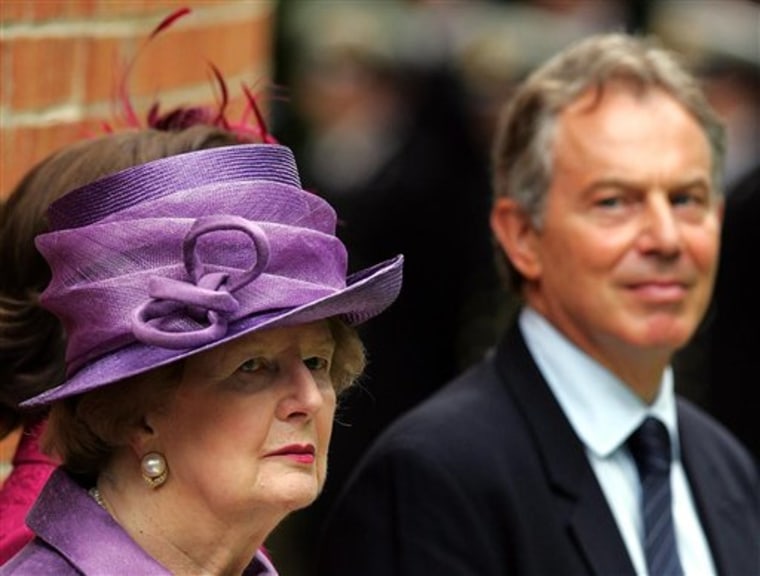Queen Elizabeth II and former Prime Minister Margaret Thatcher joined old warriors and widows of the fallen at a memorial service Thursday marking the 25th anniversary of the end of the Falkland Islands conflict.
Four Harrier jets flew over the memorial chapel at Pangbourne College west of London as the queen arrived to mark the date when British forces accepted the surrender of the Argentine army, ending a 74-day occupation. Prime Minister Tony Blair also attended the service.
The conflict, which followed Argentina's seizure of the islands on April 2, 1982, cost the lives of 255 British servicemen, many of them lost at sea, and more than 600 Argentines — half of them in the sinking of the battleship General Belgrano.
"I'm filled with sadness for the boys who never came home," said Steve Kettless, 50, who was in the Parachute Regiment in the battle for Goose Green. "That's the main emotion in remembering what happened 25 years ago for me — 25 years have gone so quickly."
Following the service, James Hailwood, whose father died in the conflict, and Leading Seaman Christopher Butler, a Falklands veteran, presented a stone which the queen placed on a cairn — a Celtic tradition of piling stones as a simple memorial.
Hailwood was 6 months old when he his father was killed.
"We must remember those who knew them — I never knew my dad — because it's more difficult for them," Hailwood told reporters.
In a message to the 3,100 residents of the islands, the queen said the British forces had "made a stand for democracy and freedom."
"Since then, you have shown that their sacrifice was not in vain by your continued loyalty and determination to safeguard and develop your way of life in these islands," the royal message said.
"This week offers you an opportunity to look back with pride on your achievements and to look forward to a prosperous future, living in freedom and governed by those whom you have chosen."
Islanders given a voice
The message underlined London's position that any change in the government of the British islands must be supported by the islanders.
The defeat of Argentina, which continues to claim the islands it calls Las Malvinas, hastened the collapse of the military regime of Gen. Leopoldo F. Galtieri. He died in 2003, under house arrest and indicted for alleged human rights abuses.
Thatcher ordered the British fleet on an 8,000-mile journey to the South Atlantic to retake the islands after diplomacy failed. Victory in the Falklands sealed Thatcher's image as the "Iron Lady" and paved the way for election victories in 1983 and 1987.
Cecil Parkinson, a member of Thatcher's War Cabinet who was attending memorial events in the Falkland Islands, said the then-chief of the Royal Navy, Adm. Henry Leach, was instrumental in galvanizing British resolve.
"Henry Leach was the one who said, 'Give me the authority and I can put a fleet to sea in 72 hours,' so then the Cabinet met the next day and that was on the table," Parkinson told Press Association, the British news agency.
